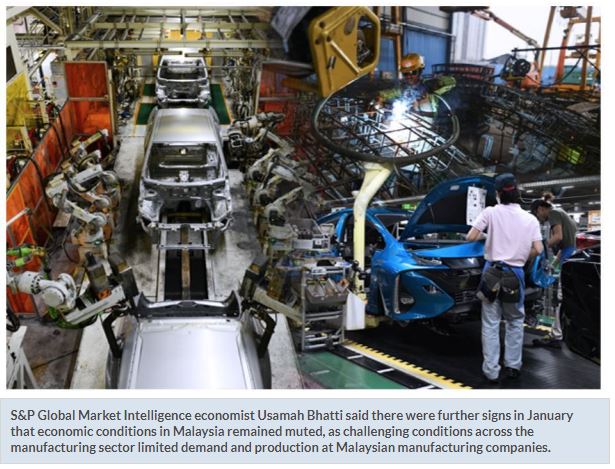Malaysia: Manufacturing PMI eases in January
PETALING JAYA: Malaysia’s manufacturing purchasing managers’ index (PMI) dipped to 46.5 in January 2023 from 47.8 in December 2022, “indicating a stronger moderation in the health of the sector,” says S&P Global.
S&P Global Market Intelligence economist Usamah Bhatti said there were further signs in January that economic conditions in Malaysia remained muted, as challenging conditions across the manufacturing sector limited demand and production at Malaysian manufacturing companies.
“The latest PMI data are still indicative of growth in official data heading into the new year, though at a softer rate.
“That said, two positives came from the latest survey result, the first being a renewed expansion in employment, helping firms to keep on top of workloads and setting a base to expand output in the future should demand start to regain momentum.
“The second was the first reduction in delivery times in just over three years as material shortages, port congestion and delivery issues continue to normalise.
“Better availability of materials also contributed to the softest rise in input prices in the current sequence of inflation that began in June 2020,” said Bhatti in a research note.
S&P Global said the latest PMI reading suggested that the gradual slowdown in manufacturing production and gross domestic product (GDP) growth at the end of 2022 was sustained into the new year.
It said the weaker headline figure was in part due to a stronger moderation in output volumes that was the steepest reported for 16 months.
S&P Global said the moderation in the headline figure was sharp and the strongest seen since August 2021, as manufacturers observed that demand and client confidence were muted in both domestic and international markets.
“As such, export demand for Malaysian manufactured goods fell further, and at the sharpest pace since June 2021,” it said.
While demand conditions moderated, S&P Global said the supply chains were able to improve at Malaysian goods producers as delivery times shortened for the first time since November 2019, albeit only marginally.
On the price front, input costs increased for the 32nd month running in January although the rate of inflation continued to ease and was the softest recorded in this sequence, as firms reported lower prices for a variety of inputs including oil.
“Looking ahead, Malaysian manufacturers were increasingly optimistic regarding the year-ahead outlook for output amid hopes that both domestic and external demand conditions would improve as the global economy recovers. The overall level of confidence rose to the strongest since August 2019 as a result,” it noted. — Bernama


 Thailand
Thailand




